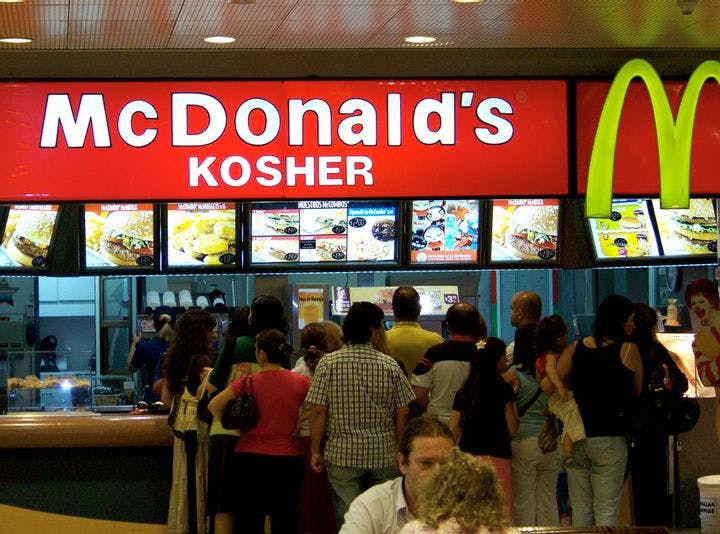Fall 2010
Food Police
– Rebecca Rosen
Observant American Jews, once consigned to a limited pantry and sparse restaurant options, are enjoying the output of a massive kosher industry.
In 2008 at Kosherfest, the annual U.S. trade show of kosher food manufacturers, certifiers, and purveyors, an Iron Chef–like culinary competition featured not brisket, nor bagels and lox, but sushi. While not traditional Jewish cuisine, California rolls and tuna sashimi are now staples of religious weddings and bar mitzvahs. Observant American Jews, once consigned to a limited pantry and sparse restaurant options, are enjoying the output of a massive kosher industry made up of thousands of mashgichim (kosher certifiers) who monitor food production to ensure that Jewish dietary laws are strictly followed. It is this industry that journalist Sue Fishkoff deliciously serves up in Kosher Nation.
The basics of these laws, known in Hebrew as kashrut (the related word, kasher, means “fit” or “proper”), are straightforward. Observant Jews do not eat milk and meat together; nor do they consume a wide variety of animals—pig, most notoriously, but also shellfish and bugs. (This makes preparing salad a complicated endeavor; who knows what might have burrowed into the celery?) Permitted animals must be ritually slaughtered and bled. Of course, it’s not so simple. How many hours must you wait to eat a dairy dessert after a meat entrée? Most Orthodox Jews say six, but German Jews say three, and Dutch Jews just one.
Today, the defining characteristic of kashrut is the extreme precautions taken to ensure that no treyfe (nonkosher food) is eaten. For example, observant Jews will not eat meat from a plate that has ever touched dairy, just in case a nano-sized speck of cheese is clinging to it for dear life. One formerly observant Jew aptly calls the entire system an “exercise in neurosis.” Such safeguards have given rise to a global kosher food industry, whose inspectors go to every corner of the globe, making sure that none of these strictures are violated at any step of the food production process. (China, for example, has nearly 2,000 food factories under kosher supervision, largely to cater to American and Israeli markets.)
Today, between a third and a half of processed food products sold in the United States are certified kosher, though “less than two percent of the population is Jewish, and only a minority of Jews keep kosher.” Much kosher-certified food is consumed by non-Jews who are vegetarians , Muslims, or believe that kosher food is somehow “purer.” And many other people who buy kosher products are simply oblivious to the tiny symbols on the packages—Nabisco, Entenmann’s, and Godiva all have stamps of approval.
When people prepared most of their meals at home from scratch, Jews had no need for mashgichim. If you bought your meat from a butcher you knew and trusted and grew your own vegetables, you could ensure the kosher status of your food yourself. But beginning in the 19th century, the advent of prepared and packaged foods removed those labors from the house and placed them behind closed factory and restaurant doors. An industry sprang up to give observant Jews peace of mind about the products they bought and ate. As Fishkoff writes, kosher certification became a business. In 1923, Heinz Vegetarian Beans was the first brand-name product to receive an official certification. (In the 1980s, the Japanese company Fuji added a symbol of kosher certification to its camera film. Upon learning of its error—only food requires certification—the company apologized, saying it had heard that products with that symbol “sell better in the United States.”)
Business is business, and since the early days of the industry, competition has been cutthroat, rife with fraud and corruption. One hundred kosher retailers amassed $4,200 in 1914 to pay for a hit job on poultry dealer Barnett Baff, suspected of underselling rivals who adhered to fixed prices. The ugly underbelly of the kashrut industry took center stage in 2008 when federal agents raided Agriprocessors of Postville, Iowa, the largest kosher meatpacking plant in the United States, and arrested 389 undocumented workers, including 18 minors. For many kosher-keeping Jews, the incident was a wake-up call: Your meat may be “kosher,” but those who bring it to your plate may not be treated fairly—or in keeping with Jewish law.
In response to the Agriprocessors scandal as well as wider American food trends, fledgling kosher movements such as “ethical kashrut” and “eco-kosher” are gaining traction. “Jews,” Fishkoff writes, “are hard-wired to link our food choices to moral and political beliefs.” Entertaining and sympathetic throughout, Fishkoff is at her finest when discussing new interpretations of kashrut.
Of course, some things never change. Last year at Kosherfest, the theme for the culinary competition was the much-beloved deli sandwich.
* * *
Rebecca J. Rosen is associate editor of The Wilson Quarterly.
Reviewed: Kosher Nation: Why More and More of America's Food Answers to a Higher Authority by Sue Fishkoff, Schocken, 364 pp, 2010.
Photo courtesy of Flickr/jglsongs
